#AND geneva convention violating via the red cross.
Text
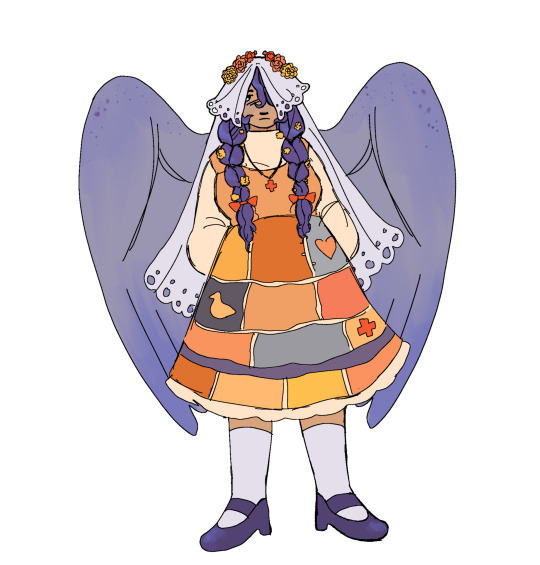
new dnd character. her name is Canary and she’s kind of a nun but kind of a criminal
#my first character with blue hair and pronouns. yippeee#AND geneva convention violating via the red cross.#and my third pc with flower head. i say head and not hair bc Chicken Tender doesn’t have hair#accidentally based her outfit on the first hanamaru solo album cover art/outfit. don’t talk to me.#my art#canary#she doesn’t have a surname yet. idk what to go with.#she’s for an upcoming campaign so i’m not a hundred percent sure about her personality yet. i think she’s a little bitchy though.#oh also she’s a winged tiefling. it’s just hard to tell bc her tail is stubby and her horns are tiny. i’m gonna draw a ref with them too bc#she’s just a funny blue lady
22 notes
·
View notes
Note
jokes about transformers being war criminals are very funny and all but Ratchet is the only character who has actually violated the Geneva convention (via unlawful use of red crosses)
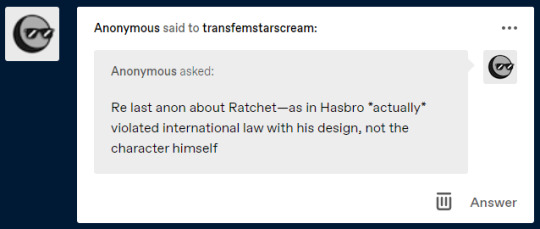
character designs that have violated the geneva convention:
1. ratchet
2. mikan tsumiki
28 notes
·
View notes
Text
I saw mention of the Geneva Convention in the newspaper (because its obvs. very relevant right now) and remembered a post from a while ago where someone (from the US) told their dad about how using the red cross symbol when you're not the red cross is a violation* of the Geneva Convention, and that their dad replied with "well I never signed the Geneva Convention" or something liberatarian like that (sorry that I'm butchering the story).
So that got me thinking: the United States of America is a signatory to the Geneva Convention, and the current political system is that if you are a citizen of a country your government represents you, and therefore, yes, you did sign the Geneva Convention via your representative. It does bind you too, random citizen.
And like I know that the thing with libertarians and various other types of folk is that they don't want to be like subjects to a government (cf. that whole sovereign citizen thing etc, going off grid and such). Heck, I am married to a person who does not want to be an American citizen, I also don't want them to be an American citizen. I think all citizenship is bullshit and nationalism is bullshit.
But all this did make me think of the fact that no one is actually forced to be a citizen. You can give up your citizenship, that is a thing you can do. (Admittedly USA makes it difficult and expensive, but if you are super dedicated to your ideal, you could do it.)
But people don't do it. Because being stateless is much worse than being a citizen of most countries (North Korea I think has a shot at being worse because of the way people are trapped there, though outside of the borders of NK it's better to be NK citizen than stateless, but I'd say most other countries it is better to be a citizen of than stateless). It's kind of like that joke by a black male stand-up comedian where he asks people in the audience to stand up if they'd want to be a black man - and no one does because everyone knows what a shitty, rotten deal black men are dealt in society.
.
* Yes, using a symbol that looks at all like a red cross (or a red crescent or a red crystal, possibly also a red magen david) is a violation of the Geneva Convention. Yes really. It is super super super important that no one else use any symbol that looks anything like those in any situation - not even online as a pfp - because those symbols are reserved for impartial aid workers in warzones and disasters.
Heck, the use of those symbols is super restricted even for red cross volunteers in non-crisis situations. And like right now Russia is violating the Geneva Convention in so many different ways so it's extra important for information war purposes to not give Russia's propaganda machine any ammo about how "the West" also violates the convention but only cares about it when Russia violates it because of hypocricy and anti-russian reasons.
#no you cannot get permission from the red cross to use the symbol for anything#not video games not first aid kits not nothing#it cannot be licenced to use in anything#war
2 notes
·
View notes
Photo


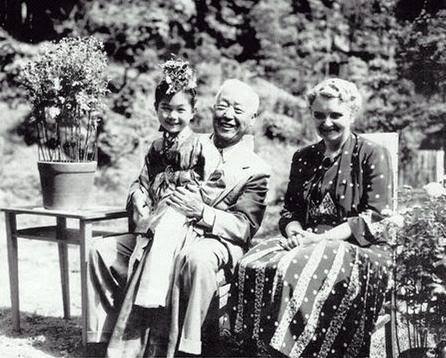
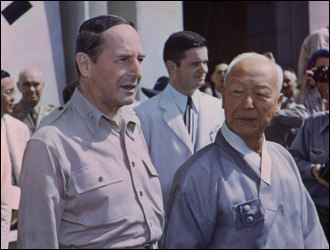
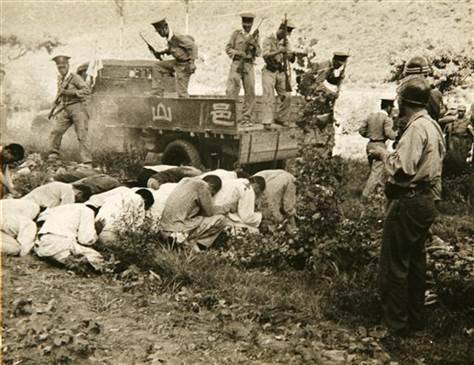
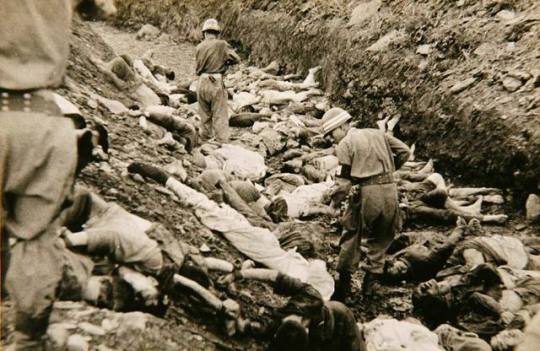

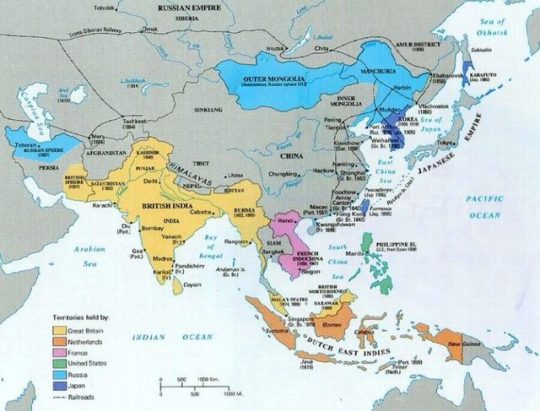

“The story of South Korea’s past starts with a provisional government often forgotten about in history textbooks. The People’s Republic of Korea lasted only from 1945 to 1946, and its capital was in Seoul...As soon as American troops landed on the September of 1945...What immediately occurred afterwards was the abolition of the People’s Republic of Korea by military decree. Officials serving under the government were shot, buildings were bombed, and supposedly “communist-sympathetic” Korean troops stationed in the country were summarily executed in a bloodbath lasting for several months. The United States Army Military Government was established, causing the eruption of mass public outrage at military personnel from the former Japanese Empire serving in office in South Korea.
With haste, the First Republic of Korea, what we now know as South Korea, was declared in 1948. Syngman Rhee was flown abroad a US military aircraft to Tokyo, travelling to Seoul, and was installed as President. Rhee immediately arrested the remaining left-wing opponents in the political arena...Syngman Rhee, as a fierce anti-communist and nationalist who would later be forced into exile by his own citizens.”

“Rhee encouraged his internal security force, headed by his trusted ally, Kim Chang-ryong, to arbitrarily detain people he suspected of having “leftist affiliations” and subject them to days of detainment in labour camps...Syngman Rhee was such a popular leader that he was re-elected four times. During elections, his political opponents often suddenly died or were arrested by South Korea’s internal security force under the suspicion of being “North Korea collaborators”.
(via The secret genocide in South Korea you’ve probably never heard of)

The Korean War: Barbarism Unleashed
“Syngman Rhee was a conservative nationalist who lived in the United States for over four decades after being imprisoned by the Japanese as a young man. The Truman administration brought him back to Korea in October 1945 to lead the new South Korean government. Considering him a “Jeffersonian democrat,” the U.S. Office of Strategic Services believed that Rhee harbored “more of an American point of view than other Korean leader.”
In practice, Rhee exhibited strong autocratic tendencies and relied heavily on Japanese collaborators – in part because he had been out of the country so long. He was elected president in July 1948 by members of the National Assembly, who themselves had been elected on May 10 in a national election marred by boycotts, violence and a climate of terrorism.
“The primary cause of the South Korean insurgency was the ancient curse of average Koreans – the social inequity of land relations and the huge gap between a tiny elite of the rich and the vast majority of the poor.” At the same time Rhee followed American dictates in passing a secret clause agreeing to export rice to Japan and signed contracts allowing American businesses to exploit the So Lim gold mine and take over the Sandong tungsten mine, which was guarded by U.S. troops.”

The director of the U.S. Army’s Department of Transportation stated: “We had a battle mentality. We didn’t have to worry too much if innocent people got hurt. We set up concentration camps outside of town and held strikers there when the jails got too full…. It was war. We recognized it as war and fought it as such.”
By mid-1947, there were almost 22,000 people in jail, nearly twice as many as under the Japanese...Professors and assemblymen were among those tortured in custody. Those branded as communists were dehumanized to the extent that they were seen as unworthy of legal protection...Any red was not considered human...Because we weren’t human, we had no rights.” The scale of repression in South Korea at this time far surpassed that of North Korea. In Mokpo seaport, the bodies of prisoners who had been shot were left on people’s doorsteps as a warning in what became known as the “human flesh distribution case.” A government official defended the practice saying they were the most “vile of communists.”
On war’s eve, seasoned intelligence analyst Lt. Walter Choinski and the South Korean G-2 chief of staff were curiously transferred and a report by distinguished cross recipient Donald Nichols predicting a North Korean attack 72 hours before was suppressed by Willoughby. This contributed to the “intelligence failure” that rendered the North Korean attack of June 25th a “surprise;” a perception that made the war more politically palatable.”

“In mid-September Gen. MacArthur engineered an amphibious landing behind enemy lines at Inchon...“Operation Chromite,” as it was called, was enabled by the seizure of Wolmi-do Island, after it was showered with rockets, bombs and napalm, and by a joint CIA-military operation on Yonghung-do, a small island ten miles from Inchon, where Navy Lt. Eugene Clark obtained vital information for the assault.
The Korean War was replete with atrocities undertaken in violation of the Geneva Convention and international laws of war, which the U.S. ironically had been instrumental in establishing (four Geneva conventions of 1949). Because of the climate of the Cold War and continued North-South division, a proper accounting and reckoning never took place, and many Koreans never were able to obtain justice for unlawful killings of their loved ones.
Whereas in the United States, most of the war atrocities were little discussed or attributed to the communists, under the South Korean military dictatorship, all sympathetic discourse designed to raise awareness of massacres was subject to prosecution. The bereaved families suffered severe discrimination as authorities marginalized them from civil society and politics and placed them under surveillance by the Korean National Police (KNP) and the Korean Central Intelligence Agency...Some of the worst atrocities occurred in the summer of 1950 when South Korean KNP and ROKA units emptied the prisons and shot detainees, dumping the bodies into hastily dug trenches, abandoned mines, or the sea.”
“The most concentrated killing of the war occurred in Taejon, where the KNP slaughtered thousands of leftists under American oversight. According to the historian Bruce Cumings, in July 1950, as “the North Korean People’s Army bore down upon the city of Taejon, south of Seoul,” South Korean police “authorities removed political prisoners from local jails, men and boys along with some women, massacred them, threw them into open pits, and dumped the earth back on them. Somewhere between 4,000 and 7,000 died . . . American officers stood idly by while this slaughter went on, photographing it for their records, but doing nothing to stop it. In September 1950 the Joint Chiefs of Staff decided to keep these photos classified; they were not released until 1999, after a determined effort by a psychologist in New York, Do-Young Lee, whose father had been murdered by southern authorities in August 1950.”
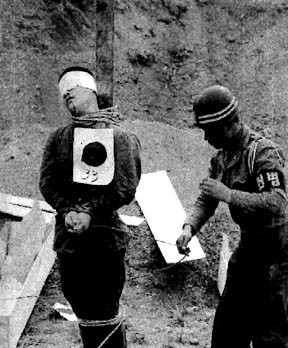
“Donald Nichols, a U.S. Air Force officer who worked in military intelligence, was the embodiment of the dark side of American participation in the Korean War. He issued bounties for the severed body parts and heads of captured communist agents, threw POWs off of helicopters, and recruited defectors for suicidal missions into the North. He also witnessed the systematic torture and massacre of Korean civilians.
In many ways, Nichols was a real-life version of Lieutenant Kurtz, a character in Francis Ford Coppola’s Vietnam War film, Apocalypse Now, who had formed his own private army which engaged in wide-scale torture and eschewed all civilized norms... “Nichols was an uncontrollable commander in a faraway shadow land. He was a highly decorated U.S. Air Force Intelligence officer who ran his own secret war for more than a decade [in which he] lost touch with propriety, with morality, with legality – even with sanity if military psychiatrists are to be believed.
[I]n Nichols, Rhee discovered a back door for delivering intelligence that could influence American policy towards Korea. He referred to the young American as ‘my son Nichols.’” According to Air Force historian Michael Haas, the personal ties that Nichols maintained for more than a decade with a foreign head of state had no parallel in the history of U.S. military operations. Incredibly, one had to ask “what the hell is a twenty three year old air force sergeant doing in the role of private confidante to a head of state.”
The capture and execution of senior communist leaders was often confirmed by cutting off their heads and sending them in gasoline cans to army headquarters in Seoul. A photo of Nichols shows him and several other army officers inspecting the heads; in another, the head of a guerrilla leader was being pulled out of its box by the hair.”

“After the North Korean invasion of the South, Nichols witnessed the massacre of hundreds of South Koreans by the ROKA at Taejon. In his memoirs, he misstated where the massacre took place in order to uphold the official army narrative that blamed the killings on the communists; an allegation reported uncritically in Roy Appleman’s official army history of the Korean War.
Nichols’ nephew stated that after he returned home from Korea, he had a huge amount of cash which he kept in his freezer. The money may have derived from currency manipulation schemes that were widely prevalent among army officers in Korea and the illicit selling of military equipment, though Nichols handled a lot of cash in running secret agents. In 1957, he was relieved of his command for undisclosed abuse of authority, and put in a straitjacket and admitted for psychiatric treatment. His nephew states that Donald told him “the government wanted to erase his brain – because he knew too much.”
(via The Korean War: Barbarism Unleashed | US Foreign Policy blog)

Failure to Communicate: U.S. Intelligence Structure and the Korean War
“The Korean War had three distinct phases. The first phase began with the North Korean invasion across the 38th parallel in June 1950...In September 1950, the amphibious landing at Inchon cut off North Korean lines and initiated the second phase of the war. U.S., ROK, and U.N. forces drove a demoralized and unsupplied North Korean army nearly back to the Chinese border. MacArthur’s decision to invade North Korea led to the third phase of the war—the Chinese decision to commit forces into the conflict.
Military leaders in the Pacific also mistrusted each other and the young civilian intelligence agencies. Willoughby and MacArthur refused to cooperate with the CIA and denied them access to Army reporting and facilities. The Air Force and Army refused to combine human intelligence efforts in Korea, specifically with regards to interrogations. The Air Force created their own interrogation team that competed with the Army’s Korean Liaison Office (KLO) and CIA for intelligence, each meeting with limited success.
Operation Trudy Jackson, a joint CIA-Navy operation, prepared the environment for the invasion. One naval officer, two Korean operatives, and three others landed on Yonghung-do Island west of Inchon and trained guerilla fighters, launched raids, and gathered intelligence. At one point up to 150 guerillas conducted island-hopping operations around Inchon. The intelligence gathered was vital to the landings and included the numbers of Chinese personnel crossing the Yalu River.”

(via Failure to Communicate: U.S. Intelligence Structure and the Korean War | The Strategy Bridge)
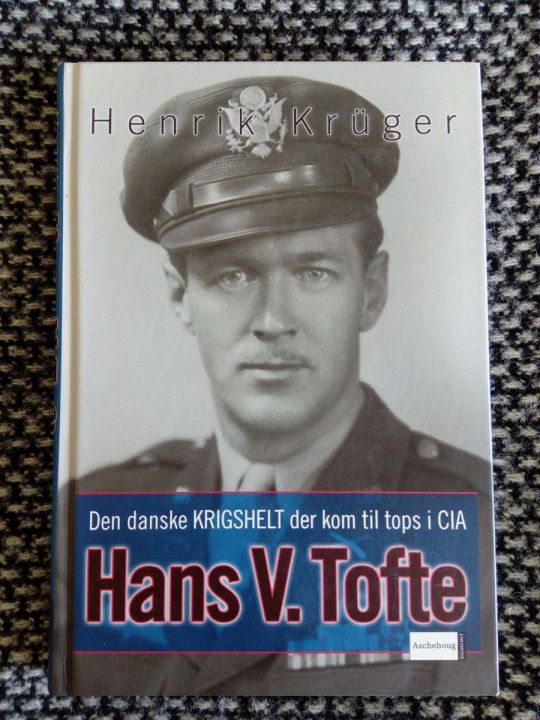
“Clark met with Hans Tofte, in charge of special operations for CIA, and asked for what help he could give in securing qualified agents. Clark also sought assistance from counterintelligence (CIC), and was able to obtain the services of an energetic bilingual Korean Navy lieutenant, Youn Joung, as well as a middle-aged ROK Colonel Ke In-Ju, Rhee’s former head of counterintelligence officer, who had been fired when he failed to predict the North Korean attack. Fearing for his life, Ke had turned himself in to the U.S. Army for protection.”
(via In Mortal Combat: Korea 1950-1953 | John Toland)
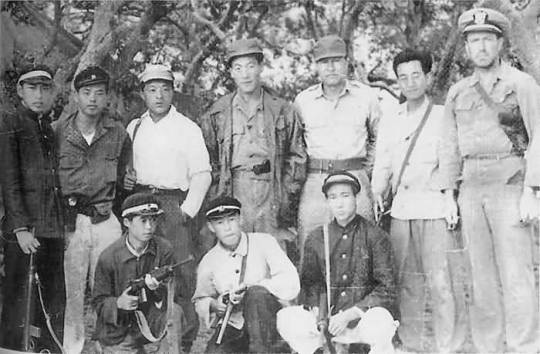
Inchon 1950: Operation "Trudy Jackson"
The Secrets Of Inchon, (2002)
Commander Eugene Franklin Clark, USN
Two of Clark's men were Korean officers: a bilingual Navy Lieutenant, Youn Joung; and a former Korean counterintelligence officer, Colonel Ke In-Ju (기인주.) Both had served on General MacArthur's staff. Youn and Ke used the aliases...to try and mask the intelligence nature of the covert mission. Youn is standing at center with the pistol at his belt [Ke In-Ju next to him]...Clark brought Youn and Ke out to the McKinley with him, but most of the men in the above photo were probably caught and killed by the North Koreans, who also murdered 50 civilians at Yonghung-do who had helped the mission succeed.
Clark later took about 150 South Korean Guerillas, including Youn, on island-hopping forays all the way up to the Yalu. In October, Clark was able to notify Tokyo Headquarters that his agents had reported large numbers of Chinese were crossing the Yalu into North Korea.High Command evidently discounted this information. The belief that China would not intervene permeated Eighth Army leadership right down to the Battalion level and lower.”
(via Inchon 1950: Operation "Trudy Jackson" | Korean War Online)
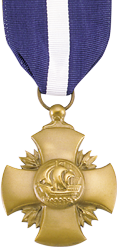
“Aug. 25 - 1950 - The first major OPC operation, code named Trudy Jackson, is conducted by a US team led by 39-year old Lt. Eugene Clark of the US Navy. Clark was a Japanese linguist attached to MacArthur's G2. He is volunteered to lead an OPC team made of Lt. Youn Joung (ROK Navy), Col. Ke In Ju, (ROKA), a US Army captain, and 10 Korean agents trained by Tofte. Col. Ke was formally an intelligence officer who was fired by Rhee for his failure to predict the invasion.
August 28, 1950 - Hans Tofte flies Clark and the two Korean officers to an OPC camp at Sasebo. There they receive a quick lesson on covert operations and get teamed up a CIA radio team. Tofte gives Clark enough weapons, rice, dried fish, sugar, whiskey and gold bars to form a guerrilla army.”
“On Augst 31, 1950, the team boarded the British warship HMS Charity and left for Inchon. They were transferred to the S Korean warship PC-703 at the entrance of Flying Fish Channel. On Sept. 1, 1950, Lt. Clark and his team landed at Yonghong-do in preparation for the Inchon (14 miles from Yonghong) landing. Clark pressed some 50 islanders into scouting missions in Inchon. Informants called in the N Korean troops; the commandos escape to a nearby island of Palmi-do leaving behind the islanders. Those who helped the Americans were shot by the communists.”
(via Eyewitness: A North Korean Remembers | Young S Kim)

Colonel Ke In-Ju (기인주) was fired and imprisoned by Syngman Rhee for failing to warn of the pending North Korean invasion. Col. Ke In-Ju was replaced by USAF Capt. Donald Nichols as head of the future KCIA (the comparison to Lt. Kurtz from Francis Ford Coppola’s film Apocalypse Now is too kind, more accurately Nichols is Reinhard Heydrich [ SS-Obergruppenführer und General der Polizei SS/GESTAPO] reincarnated), for correctly predicting the North Korean invasion.
Ke In-ju recounts that he was rescued on the eve of the mass execution, by a U.S. Army captain who drew his pistol to coax the ROKA jailers to release custody. He was under orders from General MacArthur to bring back to Army Head Quarters in Tokyo, Col. Ke In-Ju, his former G-2 counterintelligence chief of staff, from the Taejon Prison where thousands of political adversaries to President Syngman Rhee were being held. Fortunately, Col. Ke In-Ju was rescued and spared execution, unfortunately a fellow family member, our Grandfather Kee (my father became fatherless at 11 y.o., as the son of the [mayor] of Kwangju, our family impoverished, the community stepped up and took care of our family with my father granted scholarships all the way through medical school), disappeared among the thousands killed by Syngman Rhee’s death squad at the Taejon Prison. After being rescued Colonel Ke In-Ju met with Gen. MacArthur in Japan and suggested the name “Operation Bluehearts” for the code name for the invasion of Inchon.
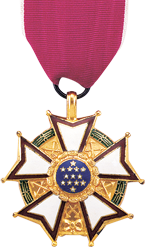
USN Lt. Eugene Clark operated a guerilla force of Korean partisans on the Yalu River, in which he is credited with providing a report to the CIC warning of a pending Chinese invasion, which was unfortunately discounted at the time. Clark like Hans Toft and other early CIA, accumulated large stashes of gold bars through the Korean War. Nichols operated a top secret North Korean currency counterfeiting operation, which was shut down by Syngman Rhee, who feared Kim Il Sung would retaliate by reciprocating and deflate the South Korean currency with counterfeit money, however there was no accounting of the secret warehouse full of cash. Hans Toft and other CIA leaders, built secret personal private islands with their newfound fortunes.
Clark and his special forces (future Navy SEAL) crossed into China to hold a village so that USAF Capt. Donald Nichols’, whose specially designed CIA “fishing boat”, was able to retrieve a downed MIG-15 (secretly flown by Russian aces) with the US Navy and Air Force providing cover support and Clark’s partisans holding back enemy ground forces. There is speculation that a cache of “Yamashira’s gold” was purportedly located by CIA agents, who clandestinely removed the “WWII war loot” before withdrawing under the guise of capturing a downed MIG-15 jet, which risks being misinterpreted by the Chinese as the start of an invasion by UN Forces, triggering a Chinese invasion in response.

Operation Chromite (film)
“Operation Chromite is a 2016 South Korean war drama film directed by John H. Lee and based on the real-life events of the Battle of Inchon, although it presents a fictionalized version of the historical CIA/US military intelligence operation "Trudy Jackson", conducted before the actual landing operation. It was released on 27 July 2016 in South Korea.”
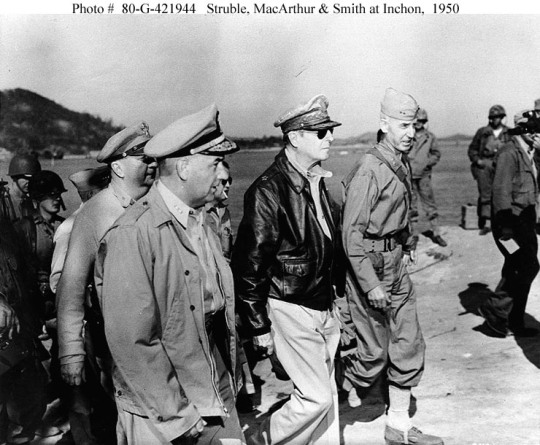
#operationbluehearts#operationchromite#operationtrudyjackson#CIAfirstwar#battleofinchon#eugeneclark#futurenavySEAL#donaldnichols#KCIAfather#syngmanrhee#1stkoreanpresident#keinju#기인주#chiefofcounterintelligence#koreanwarfilmtrilogy#bluehearts
0 notes
Link
LISTEN TO TLR’S LATEST PODCAST:
By Saagar Enjeti
A chemical weapons attack likely carried out by Syrian President Bashar al-Assad Tuesday has reignited interest in why these weapons were banned in the first place.
The first widespread use of chemical weapons dates to World War I when the Germans deployed chlorine gas. Both sides in the war quickly adopted the tactic, and within years tear gas, mustard gas, and chlorine gas were used with impunity. While gas casualties were only a small fraction of casualties in the war, doctors noted that troops were far more afraid of chemical weapons than conventional attacks.
The widespread horror at the effects of chemical weapons prompted an allied-wide effort to ban their use. Gas attacks were particularly psychologically scarring because the skin blistered, people asphyxiated, and respiratory systems were permanently damaged. Chemical weapons are also indiscriminate weapons, blowing back on those who deployed them and spreading to nearby civilian populations.
This led to a general consensus among the victorious countries of World War I to adopt the 1925 Geneva Protocol. The protocol banned the use of “poisonous gases” and “bacteriological warfare.”
The Department of State notes that former President Franklin Roosevelt declared in 1943 that use of chemical weapons “has been outlawed by the general opinion of civilized mankind.” Roosevelt also affirmed the U.S. “no first use” policy, which pledged that it would not use such weapons unless its enemies did.
The next widespread push to ban chemical weapons began at the 1980 United Nations conference on disarmament. The organization began drafting what would become the Chemical Weapons Convention (CWC), which has five key provisions:
Developing, producing, acquiring, stockpiling, or retaining chemical weapons.
The direct or indirect transfer of chemical weapons.
Chemical weapons use or military preparation for use.
Assisting, encouraging, or inducing other states to engage in CWC-prohibited activity.
The use of riot control agents “as a method of warfare.”
The existence of the Geneva protocol and lack of widespread use in major armed conflict since, demonstrates how the ban has become a generally accepted norm among the international community. However, the CWC has no enforcement mechanism to ensure that all 192 party states comply with the provisions and lacks methods to police non-signatory states like North Korea.
Former President Barack Obama’s 2012 declaration best exemplifies the international rejection of chemical weapons use saying, “We have been very clear to the Assad regime … that a red line for us is we start seeing a whole bunch of chemical weapons moving around or being utilized.” (RELATED: Flashback: Obama Dared Assad To Use Chemical Weapons, Then He Did)
Obama did not follow through on his declaration in 2013 after reports confirmed that Assad used chemical weapons against civilians and instead opted for a Russian-brokered deal where Assad would give up his chemical weapons arsenal.
Critics say Obama’s inaction weakened the international norm that chemical weapons use is intolerable and may encourage future rogue states to use them. Obama’s defenders claim it was impossible for U.S. forces to guarantee it could destroy Assad’s chemical weapons stockpile and that military action would lead to a prolonged military commitment in Syria.
An Organisation for the Prohibition of Chemical Weapons 2016 report later confirmed that Assad violated the Russian-brokered deal and kept some of his chemical weapons arsenal. He also repeatedly used chlorine gas against civilians, weapons that were not included in the deal.
President Donald Trump highlighted Obama’s inaction in 2013 as a possible reason Assad again used chemical weapons in Syria. The White House statement after the Tuesday attack said “these heinous actions by the Bashar al-Assad regime are a consequence of the past administration’s weakness and irresolution. President Obama said in 2012 that he’d establish a red line against the use of chemical weapons and then did nothing.”
U.S. Ambassador to the United Nations Nikki Haley also delivered a forceful rejection of chemical weapons use Wednesday saying “when the United Nations fails in its duty to act collectively, there are times in the life of states that we are compelled to take our own action.”
U.S. Secretary of Defense James Mattis also asserted the attack was “a heinous act and will be treated as such.”
Trump appeared to voice the same rejection Wednesday, saying the attack “crossed a lot of lines for me,” adding that it went “beyond a red line.” He continued, “I will tell you, what happened yesterday is unacceptable to me.”
Follow Saagar Enjeti on Twitter
Send tips to [email protected].
Click here for reuse options!
Copyright 2017 Daily Caller News Foundation
Content created by The Daily Caller News Foundation is available without charge to any eligible news publisher that can provide a large audience. For licensing opportunities of our original content, please contact [email protected].
WATCH TLR’S LATEST VIDEO:
The post Here’s Why The World Banned Chemical Weapons In The First Place appeared first on The Libertarian Republic.
via Headline News – The Libertarian Republic
2 notes
·
View notes
Text
Cameroon’s Anglophone Separatists Turn to Infighting | Daily news cameroon
Clashes between separatist groups in Cameroon have killed at least six fighters, with one of the groups allegedly abducting close to 40 rebels of another camp. Separatist leaders have blamed the clashes on infiltration by Cameroon’s military. But the military says the clashes are an internal rivalry for power among the separatist groups.
Cameroon - info
Cameroonian rebel leader Chacha posted a video clip on social media Sunday calling for all separatists to unite under his Southern Cameroon Restoration Forces after clashes between rebel groups.
In the video, Chacha is dressed in a red suit, with a long black cross on the back, and standing with four supporters — all armed with rifles.
He says if anybody attempts to betray their struggle to gain independence, he Chacha will kill such a traitor as he is killing Cameroon soldiers that have been sent by President Biya to eliminate true separatist fighters.
Cameroon’s military says the self-proclaimed general posted the video after he killed several members of competing rebel groups.
Chacha admitted to killing other separatists. Villagers on Saturday found six bodies in Meluf village, in northwestern Cameroon.
Local media and the Catholic Church in Cameroon report that Chacha has abducted close to 40 rebel fighters who he accused of helping the military.
Tapang Ivo Tanku is the U.S.-based spokesperson of the Anglophone Defense Forces (ADF), another Cameroon rebel group. Speaking via a messaging app, he said the abducted and killed fighters were ADF.
Tanku said the clashes between rebel groups fighting to separate the English-speaking regions from the rest of French-speaking Cameroon played into the hands of the military.
“Our soldiers who were killed were initially kidnapped by Chacha and Chacha went on to kill them. So, it is a war crime and it is strictly a crime against humanity and the violation of the Geneva conventions. And this is exactly what the regime of neighboring Cameroon wants to see in Ambazonia. It violates the Geneva conventions for the respect of prisoners or war,” he said.
Separatists have been fighting to establish a state they call “Ambazonia” since 2016. Tanku accused Cameroon’s military of infiltrating rebel groups to instigate the separatists’ infighting.
But the military says the clashes represent a rivalry for power among the separatist groups.
Brigadier General Valere Nka is commander of Cameroon’s military forces fighting against the separatists.
“I want to issue a strong warning to the so-called generals, the fake generals, Chacha, Tiger, Field Marshal and all the rest,” he said. “We already know their hideouts, their whereabouts. We are going to step up military operations and, if they do not lay down their weapons, we are going to strike and crush them.”
Clashes between Cameroon’s rebel groups have intensified in the past two months, with a number of attacks reported in the northwest and southwest.
The Bamenda Center for Conflict Resolution’s Innocent Fomo says the infighting may mark the beginning of the end to the separatist conflict. He says many people in the two regions are losing faith in the struggle for independence.
“The whole issue now is very confusing,” he said. “They say they are fighting for the Anglophones. And now, they are fighting themselves and even the Anglophones. It is terrible. A lot of people are fleeing from the [English-speaking] regions because of the kidnappings and asking for ransom and there are the Amba[zonian] fighters kidnapping the people.”
Since December, several villages in Cameroon’s Anglophone west have launched assaults on rebel camps over attacks on civilians and looting villages.
The angry villagers say they do not know who to trust, as they say the military commits similar crimes against them.
The separatist conflict has killed about 3,000 people, many of them villagers caught up in the fighting.
0 notes
Text
The Trump Administration Just Admitted a Secretly Detained American Has Asked for a Lawyer – But It Won’t Give Him One
The government is resisting ACLU efforts to make contact with the man so he can challenge his detention.
An American being held without charges by the U.S. military in Iraq has asked for an attorney, the ACLU finally learned last night following an extraordinary court hearing. The government is resisting our efforts to make contact with the man so he can challenge his detention, in an outrageous violation of the basic rights guaranteed to every American by the Constitution.
The military has held the “unnamed detainee” — as the government refers to him in its filings — somewhere in Iraq since mid-September as an “enemy combatant” for allegedly fighting in Syria with ISIS (although the government hasn’t presented any evidence of that). The Pentagon and Justice Department ignored our initial request to offer him legal assistance. We then filed a habeas corpus petition on his behalf in court in Washington, demanding that the government justify the man’s detention.
At the first hearing in the habeas case Thursday, the judge started off by asking the Justice Department attorney two questions that she thought would be easy: whether the citizen has been advised of his constitutional rights and if he has asserted his right to an attorney. The government attorney demurred, saying that the Defense Department had not released that information.
“You’re not answering my question, and I’m not trying to be impatient, but I’m growing impatient,” said Judge Tanya Chutkan after some back-and-forth. “I’m amazed you didn’t come to this hearing with that information.”
Judge Chutkan ordered the Justice Department to provide her with the answers to her questions by 5 p.m. — an unusually tight deadline for a judge to impose on the government.
At 5 p.m. on the dot, we got our answers: he was advised of his Miranda rights and he asked for an attorney. In the government’s filing, we also learned more details about what’s been happening to this American while he’s been in U.S. custody. He has been interrogated by FBI agents “for law enforcement purposes,” and they advised him of his right to remain silent and his right to an attorney. The filing also implied that the American has been questioned by other people, presumably for intelligence purposes.
The government’s response said:
The individual stated he understood his rights, and said he was willing to talk to the agents but also stated that since he was in a new phase, he felt he should have an attorney present. The agents explained that due to his current situation, it was unknown when he would be able to have an attorney, and the individual stated that it was ok and that he is a patient man. The individual then asked whether when he saw the agents next with his attorney, would it be at his current location or somewhere else. The agents told him they were uncertain when they would see him again. No further questioning of the individual for law enforcement purposes has taken place.
Now that we have this information, we’ve asked the court to order the government to ask the American if he wants to challenge his detention in court and whether he wants the ACLU to represent him or have the court appoint other attorneys for him. The government has opposed this, continuing in its effort to get our case dismissed.
The government is arguing that we don’t have standing file on the citizen’s behalf because we haven’t been in touch with him. But, as Judge Chutkan pointed out at the hearing, that’s a circular argument and a barrier of the government’s own making, since it refuses to even name the citizen. She also noted that the ACLU is not just some random person trying to get involved in a case without any connection.
“This is what they do,” she said.
The fact that the government is refusing to provide the unidentified citizen with an attorney after he asked for one is unacceptable, especially in light of the fact that he has been detained for so long. The government has said that it is working “diligently” to determine what it ominously and ambiguously calls his “final disposition.” In the meantime, the judge in the case on Friday scheduled an additional hearing for December 8.
“It’s been two and a half months — I'd like to know how long you think you get to do this to a U.S. citizen… Six months? A year?” Judge Chutkan asked. “Basically, it’s just, ‘Trust us, we know what we're doing.’”
The International Committee of the Red Cross was given access to the American to ensure that his detention conditions adhere to the Geneva Conventions, and the government argues that he could have asked the ICRC to convey his desire for an attorney to his family. But securing a lawyer isn’t the ICRC’s job. And maybe his family can’t be located, or maybe they are afraid of retaliation if the family gets involved. Maybe they don’t have the ability to find a lawyer in the United States.
Judge Chutkan recognized how dangerous the government’s claims are.
“The government could snatch any U.S. citizen off the street and hold them as an enemy combatant… for as long as it took to come to some ‘final disposition,’” she posited. “That kind of unchecked power is, quite frankly, frightening.”
from RSSMix.com Mix ID 8247012 https://www.aclu.org/blog/national-security/detention/trump-administration-just-admitted-secretly-detained-american-has
via http://www.rssmix.com/
0 notes
Text
What Are the Rights of an American Captured Fighting for ISIS?
The Constitution is clear. Any American fighting for ISIS should be transferred to federal court for prosecution.
Media outlets are reporting that the U.S. military is currently detaining an American citizen captured allegedly fighting on behalf of ISIS in Syria. The Trump administration has not released the citizen’s name or location, nor has it indicated whether the suspect will face criminal charges in federal court or be subjected to continued military detention.
But the right choice here is plain: It would be a grave error for the administration to resurrect the failed and illegal Bush-era policy of enemy combatant detentions. If, in fact, the U.S. citizen was fighting for ISIS, the surest way to safeguard both our Constitution and security is to transfer the suspect promptly to federal court to face criminal charges.
Even without knowing all the facts, the basic legal requirements for the suspect’s treatment, rights in detention, and prosecution are clear.
First, the United States may not subject any person in its custody to torture or other cruel, inhuman, or degrading treatment. Mistreating detainees is not only a war crime. It also undermines basic constitutional values and places U.S. troops in jeopardy by weakening respect for the law of war. This prohibition has long been enshrined in both the 1949 Geneva Conventions and U.S. law.
President Obama reiterated this prohibition in a 2009 executive order by confining interrogation methods to those outlined in the U.S. Army Field Manual, and Congress codified it through the McCain-Feinstein Amendment to the 2016 National Defense Authorization Act. The International Committee of the Red Cross, which monitors implementation of the Geneva Conventions, must be given access to all prisoners held in armed conflict within two weeks of their capture to ensure their treatment comports with international law.
Second, the detainee, as a U.S. citizen, is indisputably protected by the Constitution and entitled to the fundamental guarantees of habeas corpus and due process. In its landmark 2004 decision in Hamdi v. Rumsfeld, the Supreme Court ruled that U.S. citizens allegedly captured on a battlefield while fighting for enemy forces must, at a minimum, have a fair opportunity to challenge the allegations against them before an impartial decision maker. In 2008, the Supreme Court extended this basic guarantee to noncitizens held at Guantánamo.
Third, prosecution in federal court, rather than military detention, is the only legitimate course of action as a matter of domestic law and policy. The United States does not have the legal authority under its own laws to hold alleged ISIS fighters in military detention. The government may assert that the 2001 Authorization for Use of Military Force empowers it to detain the suspect, but the AUMF at most authorizes the military to capture and detain suspected terrorists who were part of or who substantially supported al-Qaida, the Taliban, or associated forces engaged in hostilities against U.S. or allied forces.
This authorization, passed days after and in direct response to the 9/11 attacks, cannot be stretched to cover individuals fighting for ISIS, a group that did not exist at the time and that has publicly opposed al-Qaida. And indeed, the Supreme Court has to date only upheld the military’s power to detain individuals under the AUMF if captured while fighting on a battlefield in Afghanistan.
The prosecution of terrorism suspects by federal courts isn’t just the legal way to go — it has proven vastly superior to any military solution. Federal courts have convicted more than 620 individuals on terrorism-related charges since 9/11. While federal terrorism prosecutions have unfairly restricted fair trial rights in individual cases, they are still part of a legitimate system with time-tested constitutional safeguards and procedures.
By contrast, the military commissions at Guantánamo remain stymied by legal controversy that stems from their underlying illegitimacy. The commissions have convicted eight individuals; four of those have been overturned on appeal in whole or in part. The military commission death penalty prosecution against Khaled Sheikh Mohammed and his alleged co-conspirators is mired in pretrial proceedings — raising fundamental fairness issues — with no trial date in sight.
Indefinite military detention without charge has proven equally problematic and lawless. The detention of alleged “enemy combatants” at Guantanamo violated human rights guarantees, resulted in widespread international condemnation, and created a category of “forever” prisoners that is an affront to basic constitutional and international law norms.
Under the Bush administration, nearly all “enemy combatants” were noncitizens, though the government occasionally extended the designation to captured American citizens, too. Perhaps most notably, the United States detained Jose Padilla as an enemy combatant following his arrest in May 2002 at Chicago’s O’Hare International Airport. Confronted with the prospect of Supreme Court review, the Bush administration eventually transferred Padilla to civilian custody in January 2006 to face federal criminal charges. Padilla’s prolonged military detention and torture in military custody remains an enduring symbol of the abuse of executive power in the post-9/11 era.
Ultimately, even the Bush administration recognized the failure of so-called enemy combatant detentions and halted the practice for newly captured suspects. The Obama administration transferred all terrorism suspects, including those seized outside the United States, to federal court for criminal prosecution. But its delay in doing so after capture in some cases raised significant legal concerns. In one case, the military held a suspect, Ahmed Adulkadir Warsame, on a U.S. naval ship for more than two months before bringing him to New York to face federal charges. Through these delayed transfers, the U.S. government could use the cover of military detention to engage in coercive interrogations of criminal suspects without counsel or access to a court, in violation of the Fifth and Sixth Amendments. We don’t know if that’s what’s happening in this case.
Both the Constitution and our government’s track record when it comes to detention make it clear: Suspected terrorists captured abroad should be transferred promptly to the United States for criminal prosecution. That goes for alleged ISIS suspects, too.
from RSSMix.com Mix ID 8247012 https://www.aclu.org/blog/national-security/detention/what-are-rights-american-captured-fighting-isis
via http://www.rssmix.com/
0 notes